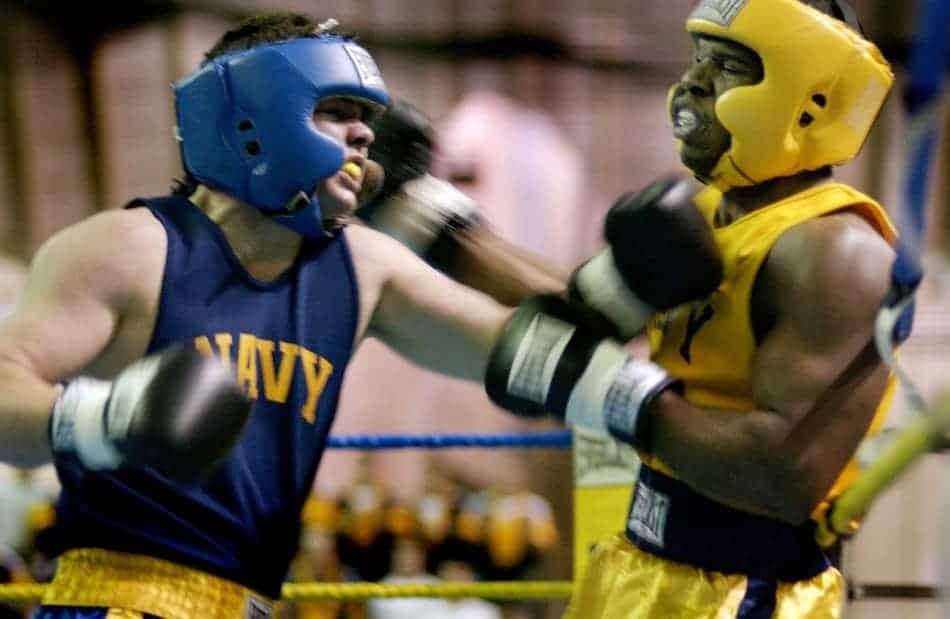
One of the first questions, the people who just started boxing or considering starting have is when they will be ready for their first sparring. I was wondering the same thing when I was a beginner. I was very excited and I really wanted to spar, but I wasn’t sure I was ready. So here is what I found from my experience:
In short, the sooner you start sparring the better. So it’s completely normal to spar in the second or even in the first week after you start boxing. The sparring is one of the most important exercises in boxing. It helps you improve your timing, distance understanding, and your overall understanding of the game. But before you enter the ring, you need to know some basics, such as the boxing stance and the basic footwork. Also, you need to be able to throw at least straight punches – the jab and the cross. Otherwise, the sparring session will be completely meaningless.
We will discuss the basics later in this article, but first, let’s dive into the reasons why most beginners are uncertain when they should start sparring.
Fear
Many beginners are afraid to spar, because of their lack of experience. They are also unconfident in their abilities and preparation. And, of course, the fear of being punched is something natural, nobody likes that. So it’s completely ok if you feel that way.
But the only way to overcome the fear of sparring is to actually start sparring. Most likely, in the beginning, your coach will put you in the ring just to see what is your level. He will watch how you react in certain situations and what are the mistakes you most often make. That way he can find your weaknesses and help you improve them. Meanwhile, you will, slowly but surely, build confidence and skills.
But there is a reason why some coaches don’t want their students to start sparring right at the beginning… Actually, I heard about boxing gyms where you need to train 2-6 MONTHS before the coach put you in the ring. And here is the reason why they do that:
Quitting
Manny beginners quit after bad sparring experiences. And how can you blame them? To be beat up by everyone in the gym can be really demotivating. That’s why some coaches prefer to wait until the person develop some basic boxing skills. Especially things like how to block and parry punches so they can properly defend themselves.
I completely understand those coaches, but there are two problems with such tactics:
- The person is missing a great opportunity to improve their skills. Like I already mentioned, the sparring is one of the most (if not the most) important boxing exercises. So if someone waits too long before he starts sparring, he is really slowing the process. Imagine two boxers. Both train for 6 months. The first one spar 1-2 times a week, and the second one doesn’t spar at all. Who you think will win in a boxing match…? I think you get the idea.
- They are also missing the fun. In my opinion, the sparring sessions are the funniest part of the boxing training. Also, during the sparring sessions, you build a better connection with the others in the gym. You can apply what you have learned, and test different techniques while making new friends, which is awesome!
But not every time the sparring sessions are so fun. Especially if you are fighting against the wrong person…
Spar against the right opponent
My first sparring was 2 weeks after I started boxing. It was against a bigger guy, who was also more experienced. He was a southpaw fighter.
We started slowly, and in the first round, there were almost no clean shots landed. But at the beginning of the second round, he threw a nasty combination at me: jab to the face – left uppercut to the body. Because he was in a southpaw stance, the uppercut landed right on my liver. The pain was real and I just fell on the ground.
That guy was an ego fighter. He liked the hard sparring because he can beat up his sparring partners (especially the beginners). I highly recommend avoiding sparring against such people – ego fighters who are more skilled than you. Or at least speak with them before starting sparring.
Most likely, your coach will put you in the ring against someone on the same level as you, but still, it’s good to be aware. (Later in this article I will give you some tips on how to deal with more skilled boxers).
So in sparring, is more important against who you are sparring than how long you train.
Different types of fighters
There are people who are just naturally tougher than others physically and mentally. Wich can be really important, especially if you are a beginner in boxing. Because in the beginning, neither you or your training partner will be skilled enough to beat the other one using strategy. So usually, the tougher or the more durable one wins.
If you feel you can handle some punches in the head (and in the body), I recommend starting sparring as soon as possible. But if you aren’t confident enough, it isn’t a big deal if you wait some time until you build confidence and skills.
Benefits of sparring
I mentioned several times that is good to start sparring early. And here are the reasons I say this:
Improving your timing – The easiest way to develop a great timing is through sparring. After you practice it for a while you will start noticing how you know when to throw a punch or when to block, without even thinking about it. Other exercises such as shadowboxing or the heavy bag drills can help you execute the different techniques correctly, but nothing can improve your timing such as sparring.
Building confidence – Some people are really afraid to be punched, but after they take several punches in the face, they see that this isn’t such a big deal. Of course, it depends on the power and the accuracy of those punches. But one thing is for sure – the more you spar, the more confident you will become.
It teaches you how to react in certain situations – If you are a beginner, you probably aren’t sure how to react when you are in a bad situation. For example when you are pressed in the corner. Well, when you spar you can test different approaches and eventually find what can help you get out of there.
Testing new techniques – If you are like me, you probably have many different boxing techniques/ideas in your head. Тhrough sparring you can test them and see what works and what doesn’t. The best time to be creative is during a sparring. If something doesn’t work out, there is almost no risk for you, unlike in a real boxing match.
It’s fun – like I already mentioned above, in my opinion, the sparring is the funniest exercise in boxing. It’s engaging and makes you enjoy the sport, which is our ultimate goal.
Tips for your first sparring
Here are the best tips for beginners I learned from my experience, that can help you in your first sparring session:
Circle in the right direction – This tip helped me dodge the liver shots of the guy I first fought in our next sparring. I just started circling to my left (his right). Thus I was avoiding his left hand and he couldn’t land body shots. If you know your opponent strengths, you can avoid them, using circular movements.
But you need to be careful. If you are moving only in one direction, you can become quite predictable. That’s why I recommend circling mostly to one direction. For example to your right (your opponent’s left) if your the other boxer is good with his right hand. But also changing the direction unexpectedly. Thus you can create angles and catch your rival off guard.
Learn your opponent – This is the most important tip if you take the sparring seriously. Before you create your strategy, you need to know what are the strengths and weaknesses of your the other fighter. Also what type of fighter he is. For example, if he has a longer reach than you and he is an out fighter (someone who fights keeps distance while fighting), you need to close the distance as quick as possible. The last thing you want is he jabbing you from a distance where you can’t touch him.
And on the flip side – if he fights on the inside, and you taller than him and have a longer reach, you need to maintain a distance. You also need to learn which are his best punches and techniques, so you can avoid them.
Use teeth protectors – Many beginners are fighting with their mouth open. That can be very dangerous. A broken tooth or jaw aren’t the best things that can happen to you during a sparring. So you better buy a teeth protector, before you start sparring.
Use your jab – Most likely, you will use mostly your jab during your first sparring. That’s because when you are a beginner your cross will probably be too slow and telegraphed so your opponent can see it easily. So I recommend to use mainly your jab and to throw cross/rear hook only as a counter punch.
Block and parry the straight punches – Chances are your rival will throw mainly straight punches at you. So you need to be prepared to parry or block them and then counter. One of the easiest ways to do it is to wait for your the other boxer to throw a jab, then push his hand downwards with your lead hand and throw a counter cross in the head.
Don’t brawl – The goal of the sparring sessions are to help you improve your technique, not to destroy your opponent. So you better don’t be too aggressive and don’t use 100% of your power when punching. Fight smart. The proper technique and the good strategy are much more important than the power.



